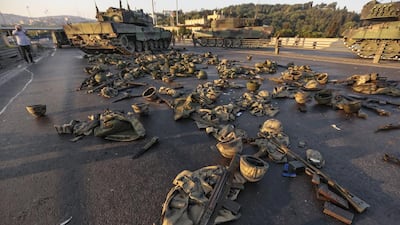Calm is returning to Turkey following a failed coup by some members of the armed forces at the weekend. While the democratically elected government has managed to reassert control, the coup will probably be remembered as a poorly fought battle in a much larger struggle for ultimate power over Turkey. The military prerogative has no place in a modern democratic state.
This failed coup is not without precedent. The Turkish military has traditionally yielded massive clout in internal politics, but that influence has diminished over the last decade of Justice and Development (AKP) party rule.
Turkish president Recep Tayyip Erdogan has dealt with previous coup attempts swiftly and with an iron fist. Mr Erdogan was vacationing at the seaside when soldiers took control of bridges in Istanbul and stormed the Turkish parliament on Friday night in a profoundly amateur display of organisation. He has firmly placed blame on the reclusive cleric Muhammed Fethullah Gülen, who lives in self-imposed exile in the United States.
The coup attempt, however, looked like a last-ditch military bid to demonstrate its role as the traditional protector of Turkey secular democratic institutions before it falls completely under Mr Erdogan’s control. The military high council is set to meet in August to discuss the reorganisation of its ranks.
Some believe these final weeks before the meeting were the army’s last chance to maintain power before a major reshuffle.
In reality, the power transfer profoundly reshaping Turkey has been well underway for nearly a decade. Mr Erdogan has systematically amassed more power than any Turkish leader since Mustafa Kemal Ataturk, and is now in the process of translating that power into ultimate control. After 11 years as prime minister, Mr Erdogan reshuffled the power structure and became the country’s first directly elected president in 2014 with 51 per cent of the general vote.
Mr Erdogan has pushed aggressively for his AKP party to win a super majority in parliament that would have allowed him to rewrite the constitution to grant the presidency unchecked powers and effectively end term limits. When the AKP failed to win a super majority in the June 2015 elections, snap elections were called for November of the same year.
Over the past half decade, Mr Erdogan has interpreted any opposition to his rule as a coup attempt. In the late 2000s, hundreds of military officers, journalists and lawyers accused of being part of a mysterious group called Ergenekon were put on trial and found guilty of a coup attempt.
Ergenekon was understood by some in Turkey as Mr Erdogan successfully neutralising any military challenges to his power. When he was satisfied that the military understood Mr Erdogan meant business, all the guilty verdicts were overturned this year after an appeals court questioned Ergenekon’s very existence.
In 2013, when leftist anti-government protesters took over Istanbul’s Gezi Park in protest of Mr Erdogan’s policies, the president decried the movement as a coup attempt and crushed the movement with overwhelming force. A year later, elements inside the Turkish police loyal to Mr Gulen released a series of wiretaps apparently showing Mr Erdogan and his close confidants engaged in widespread graft.
Mr Erdogan denounced the wiretaps as a coup, and set about a nationwide purge of Gulenist support in the police and the judiciary. Mr Gulen was accused of setting up a shadowy parallel government that was actively trying to overthrow the government.
None of these events make much sense when taken individually. But with a wider view, there is a clear direction of travel. Mr Erdogan’s path towards complete control of Turkey, while subject to a few speed bumps, has essentially proceeded unchallenged.
Friday’s coup, in all its amateur ineptitude, was an attempt by some of the military to resist the complete takeover of the armed services. After their failure, the path is now wide open for Mr Erdogan to continue implementing his policies of outlawing opposition.
He didn’t waste any time. Within hours of retaking full control of the country, Mr Erdogan sacked 2,745 judges in a preview of what is likely to unfold in the coming weeks. Bolstered by popular support against the coup attempt, the president will continue the purge of any suspected opposition. This year, he dismissed popular prime minister Ahmet Davutoglu because there was a hint of opposition in Mr Davutoglu’s public persona.
Several years ago, a high-ranking AKP minister told me that Turkey will undergo a period of instability while the AKP solidifies its power. After that bumpy period, the party’s leadership under Mr Erdogan’s guidance will put Turkey on a path to prosperity.
Turkey appears to be stuck in this period of instability, but it is clear that the successful crushing of Friday’s coup attempt will give Mr Erdogan the support needed to purge the country of all forms of opposition to his rule.
The international diplomatic fallout will be difficult and the country’s democratic institutions will weaken, but Mr Erdogan and the AKP believe the ends justify the means.
It is now up to the Turkish people, who so valiantly took to the streets of Istanbul and Ankara to defend their country from an illegitimate coup, to ensure a balance of power is created in Turkey.
jdana@thenational.ae
On Twitter: @ibnezra

